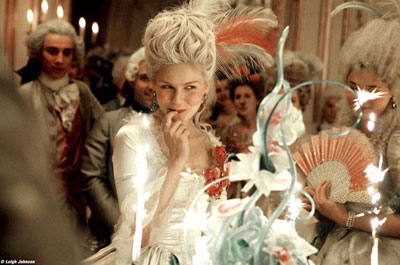Marie Antoinette (2006)

Sofia Coppola writes and directs this very revisionist piece on one of France’s most famous of queens, Marie-Antoinette. Interestingly, for such a popular historical figure, there is a dearth of biographical films about her life (the only notable film is the Norma Shearer/Tyrone Power classic from way back in 1938), except through incidental events depicting her as a supporting figure, such as tales of the French Revolution or other stories taking place in the late 18th Century.
The film is rumored to be inspired by, although not strictly adherent to, the 2001 biography, “Marie Antoinette: The Journey” by Antonia Fraser, which paints Marie-Antoinette in a more sympathetic light than many biographers previously had done. At the not-too-ripe age of 14, Marie-Antoinette (Dunst,) would be forced to grow up in a hurry, coming to France as the Archduchess of Austria, a suitable union for the French heir to the throne, then-prince Louis the XVI (Schwartzman). She was immediately expected to give Louis, and France, a proper heir to succeed them, although consummating their marriage seemed to be something Louis was unwilling to do, much to the chagrin of the politically-minded parties at their palace in Versailles.
At 19, she would become queen of France, with the marriage still unconsummated, and with a growing unease among the people as to her extravagant expenses in the face of the poverty that had been escalating since the debt-inducing previous regimes. With national bankruptcy mounting, the rumors of Marie-Antoinette’s continued lavish expenses would make her a detested figure among the common people, and soon, the French Revolution would put an end to the monarchical regime once and for all.
Coppola’s ambitious film is bound to divide viewer opinions. Her decision to direct the movie as if it were a combination of a student art film mixed with music video montages will make some feel as though this is something less than a serious endeavor. Others might find it a refreshing change of pace. Whatever the opinion, it is clear that Coppola is going for a very defined vibe in her film, blending several songs from the early 1980s, when the post-Punk/New Wave sound reigned supreme, to serve as the soundtrack to the story, including such well-known classics as “I Want Candy” by Bow Wow Wow and “Melt with You” by Modern English. Coppola, who got her break as a director in music videos, has always been one that sets up scenes in her films based on feelings rather than realism. This technique does force the viewer into accepting this style for the sake of the entertainment value of the story to properly appreciate it.
Another controversial decision it to play the historical figures out as if they were players in a modern teen drama. Coppola recognizes that Marie-Antoinette was a teenager at the time the film starts, and still a teenager at the time she would become queen. Dunst’s performance here is hardly different than those she would portray in modern-day films for young adults, and although Coppola’s dialogue does mostly avoid obvious modern catchphrases and slang, all of the actors speak in their own native dialects, with a cast blended with mostly American and British actors. Many of the scenes of the film show Louis XVI and Marie-Antoinette as children thrust into world leaders before they were ready for it, and their relative immaturity is ingrained in their personalities from start to finish. Louis is depicted as in over his head in his role as the king, allowing his handlers to strongly suggest courses of action that he unwaveringly accepted, while Marie-Antoinette would be largely unconcerned with politics, until the political world came knocking, quite literally, at her door.
All in all, I do think that Marie Antoinette is an interesting and decidedly different film that will probably please younger viewers and those unfamiliar (or just unconcerned) with the events as they actually transpired in the historical books. It does capture the essence of what it must be like to be a teenager and foreigner in a land where the people can be unforgiving and the gossip can be venomous. Perhaps the most interesting thing about the film is how bored the teens seem to be in having to play such adult roles, only really coming to life when they can do things that teens like to do, such as hang out with their friends, drink, party and frolic.
If you decide to view the film on Coppola’s terms, and that’s a very big “if”, Marie Antoinette offers a take on historical biographies you haven’t really seen before. Despite the sizable budget, it is an experimental film at its heart, although with an acclaimed director and well-known stars, perhaps it is too large a project to survive the scrutiny of those expecting much more from a major release. I suspect that some of the film’s biggest detractors in the critical media would actually praise the audacity of the project had this been an independent film done by a first-time director with no recognizable stars. If you can accept critically-acclaimed, but mostly historically inaccurate and somewhat anachronistic, films like Jesus Christ Superstar, Gladiator, and Braveheart, perhaps you might be able to cut Marie Antoinette the slack necessary, allowing the artistic license to properly engage you as a story about a young girl struggling to find herself, leaving everything she was behind her and uncertain of just what to be, only to finally emerge to the rest of the world as a historical figure larger than life.
Qwipster’s rating: ![]()
![]()
![]()
![]()
![]()
MPAA Rated: PG-13 for sexual content, partial nudity, and innuendo
Running Time: 123 min.
Cast: Kirsten Dunst, Jason Schwartzman, Rip Torn, Judy Davis, Asia Argento, Marianne Faithfull, Aurore Clement, Rose Byrne, Guillaume Gallienne, Molly Shannon, Steve Coogan, Danny Huston
Director: Sofia Coppola
Screenplay: Sofia Coppola
